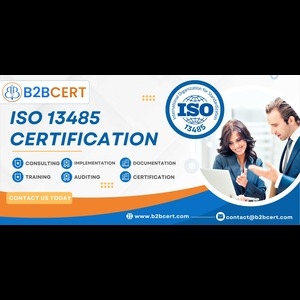ISO 13485 Certification Process in South Africa: Estimating the Duration and Milestones

ISO 13485 is an internationally recognized standard that specifies requirements for a quality management system (QMS) in the medical device industry. Achieving ISO 13485 Certification in South Africa demonstrates an organization's commitment to the safety and quality of medical devices, ensuring compliance with regulatory requirements and enhancing market access. In South Africa, obtaining this certification is particularly significant due to the regulatory landscape governed by the South African Health Products Regulatory Authority (SAHPRA).
Understanding ISO 13485
ISO 13485 Cost in South Africa provides a framework for organizations involved in the design, development, production, installation, and servicing of medical devices. The standard emphasizes risk management, process control, and the maintenance of effective processes to ensure product quality and patient safety. Implementing ISO 13485 helps organizations streamline operations, reduce risks, and improve overall product quality.
The Importance of ISO 13485 Certification in South Africa
In South Africa, SAHPRA oversees the regulation of medical devices to ensure they meet safety and performance standards. While ISO 13485 Consultants Services in Oman is not mandatory, it aligns closely with SAHPRA's expectations for quality management systems. Organizations with ISO 13485 certification often find it easier to demonstrate compliance during SAHPRA's licensing processes, facilitating smoother market entry and regulatory approval.
Certification Process and Estimated Duration
The journey to ISO 13485 Certification in Oman involves several key stages, each contributing to the establishment of a robust QMS. The duration of the certification process can vary based on factors such as organizational size, complexity, and existing quality management practices. Below is an overview of the typical milestones and their estimated timeframes:
-
Gap Analysis (1-2 months): Assess the current quality management system against ISO 13485 requirements to identify areas needing improvement.
-
QMS Development (2-4 months): Develop and document processes, procedures, and policies that comply with ISO 13485 standards.
-
Implementation and Training (2-3 months): Implement the QMS across the organization and provide training to ensure all employees understand their roles within the system.
-
Internal Audits (1 month): Conduct internal audits to evaluate the effectiveness of the QMS and identify any non-conformities.
-
Management Review (1 month): Perform a formal review by top management to assess the QMS's performance and make necessary adjustments.
-
Certification Body Selection (1 month): Choose an accredited certification body to conduct the external audit.
-
Certification Audit (1-2 months): Undergo a thorough evaluation by the certification body, which includes a documentation review and on-site audit.
-
Addressing Non-Conformities (1-2 months): If any non-conformities are identified during the audit, implement corrective actions and provide evidence of resolution.
-
Certification Issuance: Upon successful completion of the audit and resolution of non-conformities, the certification body issues the ISO 13485 Consultants in Iraq.
In total, the certification process can take approximately 9 to 15 months, depending on the organization's readiness and resources dedicated to the process.
Continuous Improvement and Maintenance
Achieving ISO 13485 Certification Services in Chennai is not the end but the beginning of a continuous improvement journey. Organizations must maintain the effectiveness of their QMS through regular internal audits, management reviews, and ongoing employee training. Additionally, surveillance audits conducted by the certification body (typically annually) ensure sustained compliance with the standard.
Conclusion
ISO 13485 certification serves as a testament to an organization's dedication to quality and patient safety in the medical device industry. In South Africa, aligning with this standard not only facilitates compliance with SAHPRA's regulatory requirements but also enhances market credibility and operational efficiency. By understanding the certification process and its milestones, organizations can effectively plan and allocate resources, paving the way for successful certification and continuous improvement in their quality management practices.
- Questions and Answers
- Opinion
- Motivational and Inspiring Story
- Technology
- Live and Let live
- Focus
- Geopolitics
- Military-Arms/Equipment
- Segurança
- Economy
- Beasts of Nations
- Machine Tools-The “Mother Industry”
- Art
- Causes
- Crafts
- Dance
- Drinks
- Film/Movie
- Fitness
- Food
- Jogos
- Gardening
- Health
- Início
- Literature
- Music
- Networking
- Outro
- Party
- Religion
- Shopping
- Sports
- Theater
- Health and Wellness
- News
- Culture

